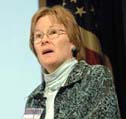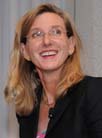 |
   |
|
December 12, 2008
Retreat Refreshes Behavioral, Social Sciences
 Dr. Christine Bachrach
Dr. Christine Bachrach
Dr. Christine Bachrach, acting director of the Office of Behavioral and Social Sciences Research, wanted just one thing out of the first-ever day-long retreat for NIH’s widely dispersed community of behavioral and social scientists, held Nov. 12 at Natcher Bldg.
December 12, 2008
CBT4CBT
New Hope for Treatment of Addiction
 Dr. Kathleen Carroll
Dr. Kathleen Carroll
Drug addiction is notoriously tough to treat, but now research is showing a fresh way to tackle the problem. It’s called computer-based training for cognitive-behavioral therapy (CBT4CBT)
OBSSR’s Mabry Wins with Systems Analysis Team
 OBSSR’s Mabry Wins with Systems Analysis Team
OBSSR’s Mabry Wins with Systems Analysis Team
More News >>
|
  |
|
January 28-29, 2009 Dissemination and Implementation Conference
February 9, 2009, 10:00 – 11:00 AM
Stigma: Lessons & New Directions from a Decade of Research on Mental Illness
July 12-24, 2009
OBSSR/NIH Summer Training Institute on Randomized Clinical Trials Involving Behavioral Interventions
May 3-8, 2009
Institute on Systems Science and Health
May 22-25, 2009
Gene-Environment Interplay in Stress and Health at the Association for Psychological Science 21st Annual Convention, San Francisco, CA
More Events >>
|
|
|
 |
 |
 |
 |
|
Home > News and Events > BSSRLectures Spring06
|
Lectures and Seminars |
National Institutes of Health
Behavioral and Social Sciences Seminar Series
Spring 2006
Mind and Body Back Together Again:
Brain Serotonin and Cardiovascular Risk
Stephen Manuck, Ph.D.
University of Pittsburgh
April 21, 2006 3:00 – 4:00 PM
Neuroscience Building, 6001 Executive Blvd.
Rockville MD, Room A
Deadly Inequality:
Uninsured Ethnic Minorities Living with Life-threatening Illness
Gaylene Becker, Ph.D.
University of California, San Francisco
May 16, 2006, 3:00 – 4:00 PM
Neuroscience Building, 6001 Executive Blvd.
Rockville MD, Room C
How Children Shape Language:
Language Acquisition and Emergence of Signed and Spoken Languages
Elissa Newport, Ph.D.
University of Rochester
June 15, 2006, 3:00 – 4:00 PM
Neuroscience Building, 6001 Executive Blvd.
Rockville MD, Room C
Winter 2006 Lectures
Organized by the
NIH Behavioral and Social Sciences Research Coordinating Committee
Supported by the NIH Office of Behavioral and Social Sciences Research
To receive announcements of lectures, visit signup
Target Audience: Primarily, the audience is NIH employees, mainly scientific, in intramural and extramural programs.
Secondarily the audience is the wider non-NIH community. The speakers are instructed to lecture at the "educated layperson" level,
assuming that the audience will have at least a college education and most likely have graduate level training. Speakers are asked
to explain key concepts.
Reasonable Accommodation (Disabilities): Sign Language Interpreters will be provided. Individuals with disabilities who
need reasonable accommodation to participate in this lecture should contact Ms. Dana Sampson, OBSSR/OD, 301-402-1146 or the
Federal Relay (1-800-877-8339).
Parkingat the Neuroscience Center is available to NIH employees and the general publicat a modest fee. For the location of
public parking on the NIH Bethesda Campus, see
http://dtts.ors.od.nih.gov/parking/parking_info.htm.
Please note that parking at NIH can be difficult!
|
|
|
 |
 |
 |
 |
|
|
 |